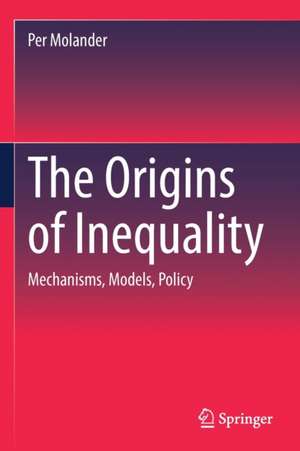The Origins of Inequality: Mechanisms, Models, Policy
Autor Per Molanderen Limba Engleză Paperback – 9 mar 2023
This book is of interest to a wide interdisciplinary social science readership, including public policy, decisionsciences, economic geography, and life course studies.
| Toate formatele și edițiile | Preț | Express |
|---|---|---|
| Paperback (1) | 457.88 lei 22-36 zile | +16.10 lei 5-11 zile |
| Springer International Publishing – 9 mar 2023 | 457.88 lei 22-36 zile | +16.10 lei 5-11 zile |
| Hardback (1) | 699.59 lei 43-57 zile | |
| Springer International Publishing – 8 mar 2022 | 699.59 lei 43-57 zile |
Preț: 457.88 lei
Preț vechi: 551.67 lei
-17% Nou
Puncte Express: 687
Preț estimativ în valută:
87.62€ • 91.71$ • 72.92£
87.62€ • 91.71$ • 72.92£
Carte disponibilă
Livrare economică 10-24 martie
Livrare express 21-27 februarie pentru 26.09 lei
Preluare comenzi: 021 569.72.76
Specificații
ISBN-13: 9783030931919
ISBN-10: 3030931919
Pagini: 210
Ilustrații: XIII, 210 p. 17 illus., 3 illus. in color.
Dimensiuni: 155 x 235 x 16 mm
Greutate: 0.32 kg
Ediția:1st ed. 2022
Editura: Springer International Publishing
Colecția Springer
Locul publicării:Cham, Switzerland
ISBN-10: 3030931919
Pagini: 210
Ilustrații: XIII, 210 p. 17 illus., 3 illus. in color.
Dimensiuni: 155 x 235 x 16 mm
Greutate: 0.32 kg
Ediția:1st ed. 2022
Editura: Springer International Publishing
Colecția Springer
Locul publicării:Cham, Switzerland
Cuprins
Introduction.- Preliminaries.- Life-cycle development.- Interaction within and between groups.- Spatial inequality.- Static versus dynamic inequality – mathematical analysis.- Philosophical and political considerations.- Conclusions.
Recenzii
“The Origins of Inequality. Mechanisms, Models, Policy is a thoughtful and thought-provoking survey of studies on the causes, conditions and factors associated with inequality. Viewed as a survey it is quite comprehensive and suitable for independent study as well as for classroom use. … Molander aims at — and to a large extent succeeds in — making sense of the processes that result in inequalities. … Molander makes a strong case to the contrary. The case is well worth studying in detail.” (Hannu Nurmi, The Journal of Economic Inequality, Vol. 20, 2022)
Notă biografică
Per Molander holds a Ph.D. in applied mathematics (control theory) but has spent most of his professional life at the interface between the social sciences and public policy-making. He has published around 100 articles, reports and books, among which Turning Sweden Around (MIT Press); Institutions, Politics and Fiscal Policy (Kluwer); Fiscal Federalism in Unitary States (Kluwer); Alternatives for Welfare Policy (Cambridge University Press) (all these co-authored), and The Anatomy of Inequality (Melville House/ Random House). He was the main architect of the Swedish central government budget reform of the 1990s and created the Swedish Social Insurance Inspectorate, where he served as the director general between 2009 and 2015. He chaired the Public Commission on Equality that delivered its report in 2020. He has also worked as an adviser to the IMF, the World Bank, and the OECD. He has received several literary prizes, among which is the Essay Prize from the Swedish Academy. Dr. Molander is a member of the Royal Swedish Academy of Sciences.
Textul de pe ultima copertă
This book presents a unified approach to the problem of inequality, combining results from a variety of research fields – the human life cycle, group dynamics, networks, markets, and economic geography. Its main message is that inequality emerges as the natural result of mechanisms operating both in individual human development and in social interaction. It posits that inequality is not an anomalous deviation from a naturally egalitarian social structure; quite to the contrary, inequality is to be expected as part of the human condition. The author states that the growth of inequality, on the other hand, is not a natural law – the level and character of inequality can be affected by collective decisions. This perspective on human inequality has potentially far-reaching consequences both for the political philosophy of inequality and for public policy-making.
This book is of interest to a wide interdisciplinary social science readership, including public policy, decisionsciences, economic geography, and life course studies.
This book is of interest to a wide interdisciplinary social science readership, including public policy, decisionsciences, economic geography, and life course studies.
Caracteristici
Builds on a unified approach to a variety of inequality problems Draws on research from areas such as human development and networks Spells out important consequences for the political philosophy of inequality
